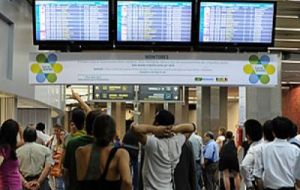MercoPress. South Atlantic News Agency
Brazil record foreign direct investment more than compensates current account deficit
 Brazilian tourists spent 21bn dollars in overseas travel last year
Brazilian tourists spent 21bn dollars in overseas travel last year Brazil posted a record-high current account deficit in 2011 on rising profit remittances by multinational companies and massive spending abroad by Brazilian tourists, but the deficit was more than covered by another record, this time for foreign direct investment, the central bank said Tuesday.
Brazil posted a record current account deficit in 2011 of 52.6 billion dollars, up from 47.3 billion in 2010, the central bank said. The 2011 deficit was equal to 2.12% of gross domestic product.
But, as in past years, the current account gap was more than covered by rising foreign direct investments, the central bank said. Foreign direct investment hit a record of 66.7 billion dollars in 2011, up from 48.5 billion the previous year.
Armed with a strong Brazilian Real currency and backed by rising personal incomes, Brazilians spent a record of more than 21 billion dollars on overseas travel in 2011, rolling up a deficit in the country's travel accounts of 14.5 billion. The gap in travel accounts in 2010 was 10.5 billion.
Meanwhile, multinational companies installed in Brazil stepped up profit remittances in 2011, this time to a record of 38.2 billion. Remittances in 2010 were 30.4 billion.
The rise in remittances was similar to the pattern in 2008 and 2009, when profitable Brazilian subsidiaries sent money back to parent companies to cover losses posted by units elsewhere in the world.
Tulio Maciel, the central bank's statistical coordinator, said, “The 2011 deficit was fully financed by foreign direct investment, which presented strong inflows throughout the year in a demonstration of continued foreign investor confidence in the Brazilian economy.”
On the other hand, foreign investors were less sanguine about Brazil in 2011 when it came to so-called portfolio investments, money placed in Brazilian stocks and bonds. Net inflows on the portfolio side in 2011 amounted to 17.5 billion, a respectable figure but down sharply from 67.8 billion in 2010. Analysts noted that many foreign investors pulled out of Brazilian stocks and bonds in 2011 as the government hiked taxes on different investment options during the course of the year.
Maciel added that the overall 2011 current account deficit “reflects continuing economic growth and heavy Brazilian demand for goods and services from abroad, for both consumers and businesses”.
He added that Brazilian businesses, like tourists, joined in the overseas shopping spree in 2011, with spending abroad on equipment rentals, transport and information technology services all increasing by 10% or more in 2011 over 2010 levels.
The trade balance was also positive with a surplus of 29.8 billion dollars.
Brazil's economy expanded by about 3% in 2011, a sharp decline from the 7.5% pace in 2010 but still faster than many of the world's biggest economies, and a strong enough performance to cut the unemployment rate to record lows, Maciel pointed out.
The central bank's standing forecast for the 2012 current account deficit is 65 billion dollars, or 2.44% of GDP, based on heavy demand for imports from both consumers and businesses. Economic growth is expected to be somewhat higher in 2012 than in 2011, with the Finance Ministry forecasting GDP expansion of 4% to 5.5%.




Top Comments
Disclaimer & comment rulesCommenting for this story is now closed.
If you have a Facebook account, become a fan and comment on our Facebook Page!